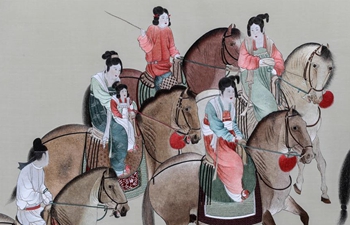SYDNEY, Aug. 2 (Xinhua) -- A 36-year-old Australian man has become the second person from the country to win what is described as the Nobel Prize for mathematics with fellow academics on Thursday, highlighting his prodigious talent and stellar achievements in the field.
Western Australia's Akshay Venkatesh, now a professor of mathematics at Stanford University in the United States, received the Fields Medal, which is "awarded every four years to between two and four researchers under 40 years old to recognize outstanding mathematical achievement for existing work and for the promise of future achievement", according to a statement from the Australian Academy of Science.
In 2006, mathematician Terence Tao was the first Australian to receive the accolade.
"A lot of the time when you do math, you're stuck, but at the same time there are all these moments where you feel privileged that you get to work with it. And you have this sensation of transcendence, you feel like you've been part of something really meaningful," the academy quoted Venkatesh, who received his medal at a ceremony overnight in Brazil, as saying.
Academy Fellow and University of Western Australia professor Cheryl Praeger, who has known Venkatesh since he was 12, said "He is extraordinary."
"Akshay became the youngest ever student to study at UWA and went straight into second year maths units, writing exam papers over the summer for core first year maths courses he had never taken to demonstrate that he did not need to do those units."
Venkatesh went on to earn a bachelor's in mathematics and physics with first class honors at the university in 1997, becoming the youngest to do so, according to the academy. When he was 16, the math prodigy left Australia for the United States, completing his PhD in math at Princeton University in 2002.
He has since been recognized for "his synthesis of analytic number theory, homogeneous dynamics, topology and representation theory."
The medal is named after Canadian mathematician John Charles Fields (1863-1932), who conceived the award "to celebrate the great achievements in the area."

















